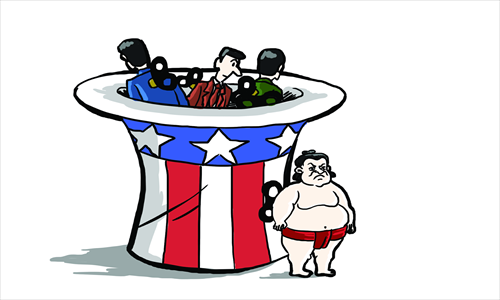US backing may prove costly for Japan

The US House Committee on Foreign Affairs held a hearing on September 12. Many lawmakers accused China of "bullying" its neighbors in the South China Sea and West Pacific. Although the hearing mainly dealt with the South China Sea issue, Japan must be pleased to hear such accusations.
Japan has been stressing the possible application of the US-Japan alliance to the Diaoyu Islands dispute. Japan has shown a tougher attitude toward China than toward its other neighboring countries, which is partly because it believes in US backing in case of any conflict with China.
The Japanese think that even if China is not scared of Japan, it must hold the US-Japan military alliance in awe.
However, many Chinese strategists believe that the US will never go to war for the sake of other countries' interests, nor will it help Japan over the issue of the Diaoyu Islands, on the sovereignty of which the US does not have a clear stance.
The US says the US-Japan military alliance applies to the Diaoyu Islands, over which China feels indifferent while Japan is moved to tears.
But no strategists believe China and the US will risk confrontations over the Diaoyu Islands. The islands dispute is an obstacle between China and Japan, while it is only a small issue between China and the US. Even Japan is not a big deal in the relationship between China and the US. Japan cannot be a decisive factor in the relationship between the two.
But it's true the US is troubling China by making use of Japan. Many Chinese believe that the provocations by Japan over the Diaoyu issue have US backing.
After all, Japan is nothing but a puppet of the US. From a strategic point of view, its territorial dispute with China does not mean much for the US, just as China's dispute with the Philippines over Huangyan Island does not mean much for the US either.
Both Japan and the Philippines have constrained China's diplomacy, but Japan is showing a stronger stance. They are the tools used by the US to contain China in East Asia. But neither Japan nor the Philippines is in the core interests of the US.
The US does not want its hegemonic status to be challenged and wishes for a stable process in which it holds the hegemony. It is worried that once there's a strategic confrontation between China and itself, it won't be able to bear the consequences.
The US is seeking its own interests by making fools of Japan. Both China and the US itself know tacitly that they can create trouble for each other by making use of Japan.
Who will win in a confrontation between China and Japan in the long run is clear. Japan wants to turn its conflict with China into one between China and the US.
However, it is only up to China and the US, not Japan. Japan's strategy has made it only play a small role in the international arena.
If China and the US turn to strategic confrontation one day, Japan, the puppet, will be the one to be sacrificed. Japan should stop the illusion that its alliance with the US will help it solve the Diaoyu Islands dispute, which does it no good.
The article is an editorial published in the Chinese edition of the Global Times Friday. opinion@globaltimes.com.cn